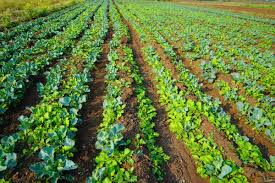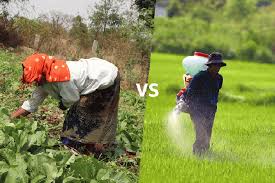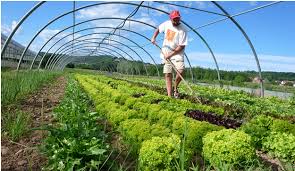Organic farming has gained significant attention in recent years as consumers, policymakers, and agriculturalists alike strive for sustainable and environmentally friendly solutions. This farming method, which avoids synthetic chemicals and emphasizes ecological balance, is not just a trend—it represents a critical shift towards more sustainable agriculture practices. This article explores the principles, benefits, challenges, and future potential of organic farming.
The Principles of Organic Farming

Organic farming is rooted in a philosophy that promotes harmony with nature. The fundamental principles include:
- Health of Soil and Ecosystems: Organic focuses on enhancing soil fertility and maintaining biodiversity. Techniques such as crop rotation, green manure, and composting are integral to ensuring that soil remains nutrient-rich.
- Prohibition of Synthetic Chemicals: The use of synthetic pesticides, herbicides, and fertilizers is strictly avoided. Instead, organic farmers rely on natural alternatives, including biological pest control and organic compost.
- Animal Welfare: Livestock in organic systems are treated humanely, provided with organic feed, and given ample space to roam. Hormones and antibiotics are largely avoided unless necessary for animal health.
- Sustainability and Environmental Stewardship: Organic seeks to reduce environmental impacts through practices like reduced tillage, water conservation, and the use of renewable energy sources.
Benefits of Organic Farming
Organic farming offers numerous advantages that extend beyond the farm itself.
- Environmental Protection: By eliminating synthetic chemicals, organic farming minimizes pollution in soil, water, and air. This approach helps preserve ecosystems and supports biodiversity.
- Improved Soil Health: Organic methods like crop rotation and composting enhance soil structure and fertility, leading to long-term agricultural productivity.
- Healthier Food Options: Organic produce is free from synthetic residues, making it a healthier choice for consumers. Studies suggest that organic crops often contain higher levels of antioxidants and essential nutrients.
- Reduced Energy Consumption: Organic generally relies less on fossil fuels compared to conventional methods, thereby reducing carbon emissions.
- Economic Opportunities: The demand for organic products has created new markets, providing farmers with better income opportunities. Consumers are often willing to pay a premium for organic goods, reflecting their perceived value.
Challenges Faced by Organic Farming

Despite its benefits, organic farming is not without its challenges. Transitioning to and maintaining organic certification requires effort, investment, and time.
- High Initial Costs: Setting up organic farms can be costly due to the need for specialized equipment, organic seeds, and labor-intensive practices.
- Certification Requirements: Farmers must adhere to strict standards and undergo rigorous inspections to earn and maintain organic certification, which can be time-consuming and expensive.
- Lower Yields in the Short Term: During the transition from conventional to organic, yields often decline as the soil adjusts to new practices.
- Pest and Disease Management: Without synthetic chemicals, managing pests and diseases can be more complex and labor-intensive.
- Market Competition: While demand for organic products is growing, competition from conventional farming remains strong, especially in regions where consumer awareness of organic farming is limited.
Key Practices in Organic Farming
Organic farming employs a variety of innovative and traditional techniques to achieve its goals.
- Crop Diversification: Planting a variety of crops enhances soil health and reduces vulnerability to pests and diseases.
- Composting: Organic matter such as food waste and manure is composted to create natural fertilizers that enrich the soil.
- Biological Pest Control: Beneficial insects, birds, and other natural predators are used to manage pests instead of relying on chemical pesticides.
- Green Manure and Cover Crops: Plants like clover and vetch are grown to cover the soil, preventing erosion and improving fertility.
- Water Management: Efficient irrigation systems and rainwater harvesting help conserve water resources in organic farms.
The Role of Organic Farming in Climate Change Mitigation

Organic farming has significant potential to mitigate climate change by reducing greenhouse gas emissions and enhancing carbon sequestration.
- Carbon Storage: Organic practices like minimal tillage and increased organic matter in the soil enhance carbon storage, reducing the amount of carbon dioxide in the atmosphere.
- Lower Emissions: Organic farms typically use fewer fossil fuels and synthetic inputs, resulting in lower greenhouse gas emissions compared to conventional farms.
- Resilience to Climate Stress: Organic systems often demonstrate greater resilience to extreme weather events due to improved soil health and biodiversity.
The Global Perspective on Organic Farming
Organic farming is practiced worldwide, with partaitogel significant growth in both developed and developing nations. The global organic food market has witnessed steady expansion, fueled by increasing consumer awareness about sustainability and health.
- In Developed Nations: Countries like the United States, Germany, and Australia have well-established organic farming sectors, supported by strong consumer demand and government policies.
- In Developing Nations: Organic is gaining traction in regions like Africa and Asia, where traditional farming methods align closely with organic principles. However, lack of infrastructure and certification challenges often hinder growth.
Future Potential of Organic Farming
The future of organic farming is promising, with opportunities to address global challenges such as food security, climate change, and biodiversity loss.
- Technological Integration: Advances in technology, including precision farming and data analytics, can help organic farmers optimize yields while adhering to sustainable practices.
- Increased Consumer Awareness: As more consumers prioritize health and sustainability, the demand for organic products is expected to rise further.
- Policy Support: Governments and international organizations can play a crucial role in promoting organic farming through subsidies, research funding, and awareness campaigns.
- Scaling Up: Efforts to scale up organic farming must focus on making it accessible and viable for small-scale farmers, especially in developing countries.
Conclusion
Organic farming represents a vital step towards a more sustainable and health-conscious agricultural system. While challenges remain, the benefits it offers to the environment, human health, and economies cannot be overstated. By embracing innovative practices, supporting farmers, and fostering global collaboration, the organic farming movement can continue to grow, contributing to a healthier planet for future generations.





